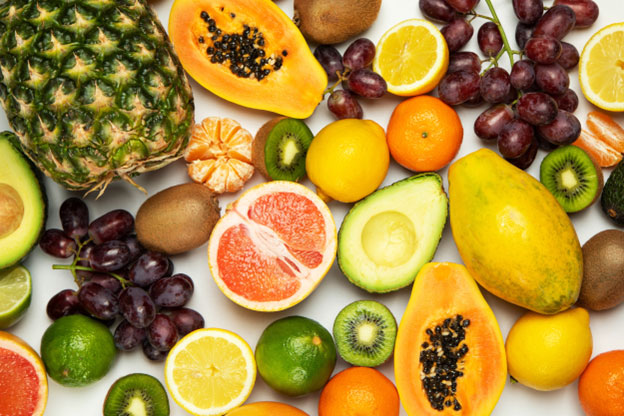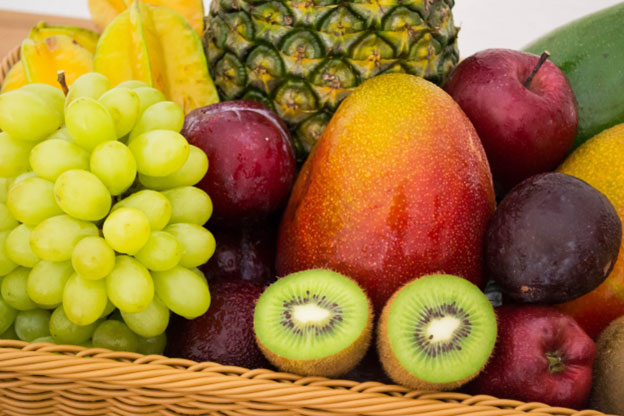Fruits are an essential part of a healthy diet. Eating plenty of fruits helps to provide the body with important vitamins and minerals, as well as dietary fiber that can help promote good digestive health. But when is the best time to eat these nutritious snacks?

Morning: Start Your Day with Fruits
One of the key reasons to include fruits in your morning routine is their ability to regulate blood sugar levels. Many fruits have a low glycemic index and are packed with natural sugars as well as fiber. By consuming fruits in the morning, you fuel your body with the necessary energy without causing blood sugar spikes. This prevents energy crashes and keeps you energetic throughout the day.
Boosting Energy and Hydration
By consuming fruits in the morning, you give your metabolism a kickstart, allowing it to work efficiently throughout the day. Fruits are rich in natural sugars that give your body the necessary energy without causing blood sugar spikes. This means no energy crashes and a sustained level of energy to keep you going.
In addition to their energizing properties, fruits are incredibly hydrating. After a night of rest, your body may be in need of hydration, and fruits can help replenish lost fluids. Fruits like watermelon, oranges, and strawberries have high water content, providing a refreshing way to start your day and keep your body hydrated.
Aiding Digestion
Incorporating fruits into your morning routine can have a significant impact on your digestion and overall well-being. Fruits are packed with fiber, a crucial component in maintaining a healthy digestive system.
Fiber acts as a natural stool softener, promoting regular bowel movements and preventing constipation. By starting your day with fruits, you provide your body with the necessary fiber content to support optimal digestive health.
Moreover, fruits contain soluble fiber, which absorbs water and adds bulk to your stool. This helps regulate your bowel movements, ensuring a smooth and efficient digestive process.
Midday: Incorporating Fruits into Your Lunch
When it comes to maintaining a well-balanced and healthy diet, incorporating fruits into your meals is a must. And what better time to enjoy the goodness of fruits than during your midday meal? Adding fruits to your lunch not only adds a burst of flavor and freshness to your plate but also provides a range of health benefits.
Nutrient Absorption and Satiety
Fruits contain enzymes and acids that aid in the digestion and breakdown of proteins, carbohydrates, and fats. By consuming fruits alongside your main meal, you can maximize the absorption of vital nutrients from your food, ensuring that your body can make full use of everything you eat.
Moreover, the fiber and water content of fruits contribute to a feeling of fullness and can help control appetite. The soluble fiber found in fruits forms a gel-like substance in the digestive tract, slowing down the digestion process and promoting satiety. This can prevent overeating and assist in weight management.

Balancing Blood Sugar Levels
When you consume fruits during your midday meal, you provide your body with a natural source of carbohydrates. These carbohydrates are gradually broken down by the body, resulting in a slower and more stable release of sugar into the bloodstream. This helps prevent sudden spikes and crashes in blood sugar levels, providing a steady and sustained source of energy throughout the day.
Afternoon Snack: Nourishing and Refreshing
The afternoon slump is a common experience for many of us. As the day wears on, energy levels tend to dip, and cravings for sugary and unhealthy snacks can become overwhelming. Instead of reaching for that bag of chips or a sugary treat, why not opt for a nourishing and refreshing afternoon snack?
Replenishing Nutrients and Hydration
By selecting fruits as your afternoon snack, you are providing your body with natural sugars that supply a steady release of energy without the sudden spikes and crashes associated with processed snacks. Additionally, fresh fruit contains fiber, which slows down the digestion process and helps regulate blood sugar levels.
Managing Cravings and Promoting Weight Management
In addition to being low in calories, fruits are also packed with essential vitamins, minerals, and antioxidants. These nutrients not only support overall health but can also aid in weight management. By incorporating a variety of fruits into your diet, you ensure that your body receives vital nutrients while keeping your calorie intake in check.
Evening: Light and Digestible Choices
Citrus fruits like oranges, grapefruits, and lemons are excellent choices for the evening. They are refreshing, low in calories, and pack a punch of vitamin C. Citrus fruits are also known for their hydrating properties due to their high water content, making them an ideal choice to keep you hydrated in the evening.
Promoting Digestion and Sleep
Consuming fruits in the evening can promote digestion and improve sleep quality. Fruits are known for their easily digestible nature, making them a light and healthy option for an evening snack.
Eating fruit in the evening can aid in nighttime relaxation. Fruits are rich in vitamins, minerals, and fiber, which can help regulate the digestive system and prevent digestive issues that may disrupt sleep. The fiber content in fruits supports healthy digestion by promoting regular bowel movements and preventing constipation.
Managing Sweet Cravings
Incorporating fruits into your evening routine is not only a healthy choice but can also help satisfy those sweet cravings. Instead of reaching for sugary snacks or desserts, opt for a piece of fruit to satisfy your taste buds.

By choosing fruits to satisfy your sweet tooth, you can indulge in something delicious while also benefiting from the numerous health advantages fruits offer. They are low in calories and high in water content, helping to keep you hydrated and feeling full. Additionally, fruits are packed with essential nutrients that support overall well-being and reduce the risk of chronic diseases.
Conclusion
In conclusion, there is no one-size-fits-all answer to the best time to eat fruits. It largely depends on individual preferences and digestive needs. However, incorporating fruits into your daily routine can provide numerous health benefits.
Ultimately, listening to your body and incorporating fruits into your diet in a way that suits your individual preferences and digestive needs is key. So, enjoy fruits throughout the day and reap the amazing health benefits they offer.
Frequently Asked Questions:
Can I eat fruits at any time of the day?
Yes, you can eat fruit at any time of the day. However, the timing of fruit consumption may affect how your body processes and benefits from the nutrients they provide.
Is it better to eat fruits on an empty stomach?
Eating fruits on an empty stomach is often recommended. This is because fruits are easily digested and can help kick-start your metabolism and provide a quick source of energy. Additionally, consuming fruits on an empty stomach may help regulate blood sugar levels and prevent spikes.

Are there any fruits that are best eaten at specific times?
While all fruits offer health benefits, there are some that are best eaten at specific times. Citrus fruits such as oranges and grapefruits are great to consume in the morning as they are refreshing and can aid in digestion. On the other hand, fruits high in natural sugars, like bananas and mangoes, are better consumed earlier in the day to allow your body ample time to burn the energy they provide.
Can eating fruits before bed disrupt sleep?
Eating fruits before bed is generally not recommended, especially if you are prone to digestive issues. Fruits are rich in fiber and can take longer to digest, potentially causing discomfort or disrupting sleep. If you do choose to eat fruits before bed, opt for lighter options like berries or melons.
How many servings of fruit should I aim for each day?
The ideal fruit intake varies according to age, sex, and activity level. However, it is recommended to aim for at least 2 fruit servings per day. This can be achieved by consuming a variety of fruits throughout the day, including whole fruits, fruit salads, or even incorporating them into smoothies.


